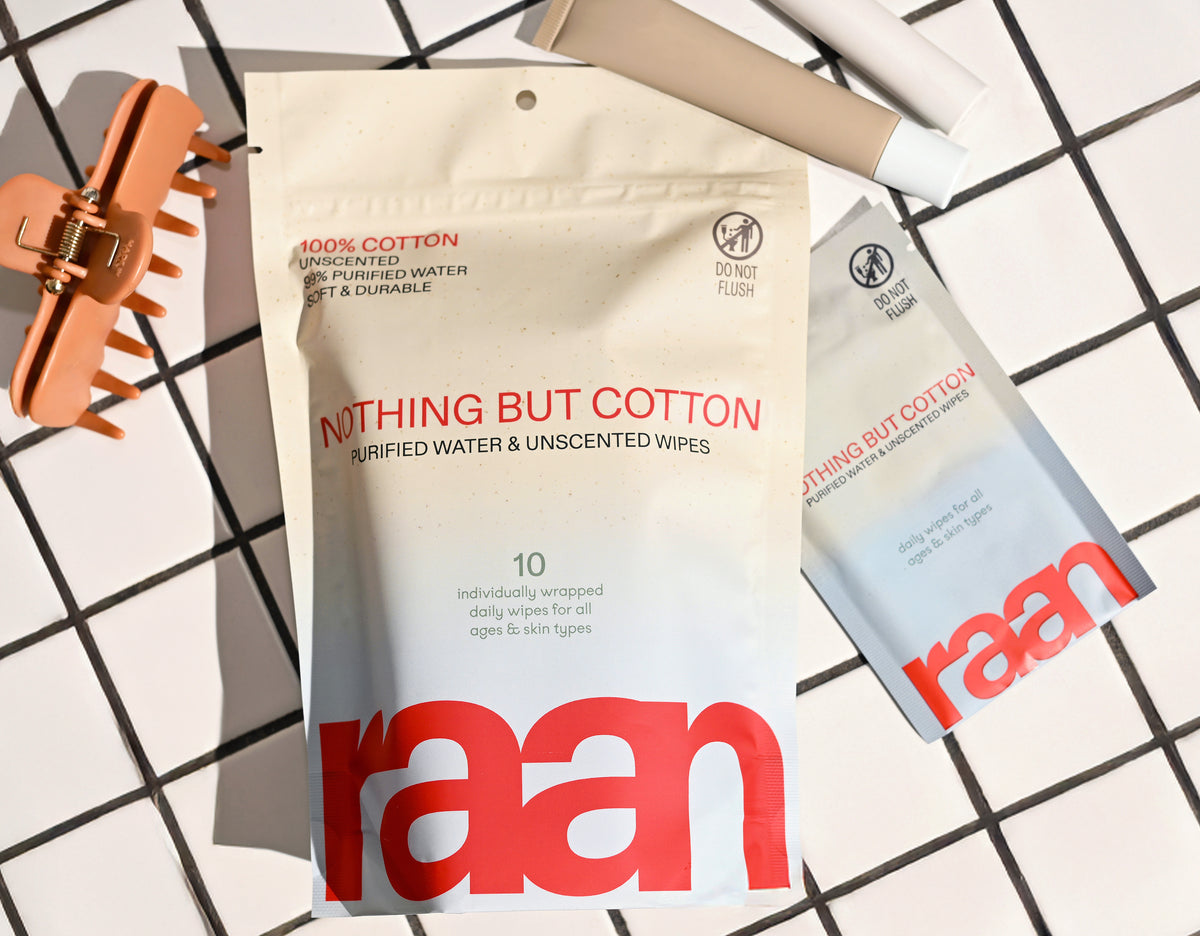Key Takeaways
- Delicate skin requires special care and does not respond well to typical products.
- Newborns and individuals with sensitive skin need wipes that are gentle and non-irritating.
- Finding effective wipes for delicate skin can be challenging and requires careful selection.
- Using the wrong wipes can cause irritation and discomfort for sensitive skin types.
Table of Contents
- What Are Wipes for Delicate Skin Care?
- Why Choosing the Right Wipe Matters for Delicate Skin
- Key Ingredients for Delicate Skin: What to Look For
- Ingredients and Practices to Avoid
- Key Ingredients for Delicate Skin: What to Look For
- Ingredients and Practices to Avoid
- Transparency, Certifications, and Ingredient Integrity
- Best Wipes for Delicate Skin: Our Top Picks
- Making the Right Choice for Your Delicate Skin
- Beyond the Wipe: Building a Delicate Skin Routine
- Your Delicate Skin Deserves Better
Delicate skin doesn't play by the same rules. Whether you're caring for a newborn's paper-thin cheeks, navigating your own sensitive face after a long day, or dealing with skin that reacts to seemingly everything, finding wipes that actually work without causing irritation feels like searching for a needle in a haystack.
The problem isn't just sensitivity itself. It's that most wipes on the market are loaded with plastic fibers, synthetic fragrances, and mystery ingredients that sound more like a chemistry experiment than something you'd want touching your skin. "Clean" claims are everywhere, but transparency? That's much harder to find.
Here's what we know: delicate skin needs honesty, not hype. It needs materials that make sense, like unbleached, 100% cotton instead of plastic blends. It needs ingredients you can actually understand, not a laundry list of unpronounceable additives. And it needs brands willing to tell you exactly what's in the package, without the marketing fluff.
We've tested, researched, and compared the top wipes designed for delicate skin care to help you cut through the noise. From newborn-safe formulas to adult face wipes that won't leave you red and irritated, here's what actually works, and why it matters.
What Are Wipes for Delicate Skin Care?
Delicate skin wipes are specifically formulated to be gentle, safe, and non-irritating for the most sensitive areas of your body. Unlike standard cleaning wipes that prioritize heavy-duty mess removal, these focus on maintaining your skin's natural barrier while providing effective cleansing.
The key difference lies in both the material and the formula. Quality delicate skin wipes use soft, breathable fabrics, ideally unbleached, 100% cotton, paired with minimal, well-understood ingredients. Think 99% water with a few carefully chosen additions like organic aloe for moisture and food-grade preservatives for safety.
Who Needs Delicate Skin Wipes?
- Newborns and infants, their skin barrier is still developing
- Toddlers with extra-sensitive skin, prone to diaper rash and reactions
- Adults with sensitivities, allergies, or eczema, need proven gentle formulas
- Skincare enthusiasts, want clean ingredients that won't disrupt routines
- Anyone seeking safer everyday cleaning, for faces, hands, and quick refreshes
You'll reach for these wipes during diaper changes, after workouts, for travel cleanup, sticky situations with kids, and gentle face cleansing when water isn't available. The versatility matters, one product that's safe enough for a baby's bottom should work just as well for your face after a long day.
Why Choosing the Right Wipe Matters for Delicate Skin

Delicate skin isn't just "a little sensitive", it's fundamentally different. Babies have thinner skin with a developing barrier function, making them more susceptible to irritants. Adults with conditions like eczema, rosacea, or general sensitivity face similar challenges: their skin reacts faster and more intensely to harsh ingredients.
The risks are real. Wrong ingredients can trigger contact dermatitis, worsen existing conditions, or cause new sensitivities to develop. Fragrances alone are responsible for countless skin reactions, yet they're still stuffed into products marketed as "gentle."
The Problem with Conventional Wipes
Most standard wipes are built for convenience, not skin health. They rely on plastic fibers that can cause micro-abrasions, harsh cleansers that strip natural oils, and synthetic preservatives that leave residual stickiness. Many contain formaldehyde releasers, parabens, or phthalates , ingredients linked to hormone disruption and allergic reactions.
Then there's the greenwashing. "Natural" doesn't mean safe, and "organic" on the front label doesn't guarantee the entire formula meets that standard. Without full ingredient transparency, you're essentially gambling with your skin.
The Bottom Line: Delicate skin needs predictable, honest ingredients. Every component should have a clear purpose, and every claim should be backed by certifications you can verify.
Key Ingredients for Delicate Skin: What to Look For
The science of delicate skin care comes down to one principle: simplicity works better than complexity. Fewer ingredients mean fewer opportunities for reactions, and well-understood components are easier to trust.
Water-Based Formulas (99% Water)
The gentlest wipes start with purified water as their primary ingredient. This isn't just filler , water provides the cleaning action without harsh detergents. Look for formulas that are 99% water with only a few functional additives.
Gentle Moisturizers and Skin Conditioners
Organic aloe vera stands out as a proven skin soother that's been used safely for centuries. It provides moisture without clogging pores and has natural anti-inflammatory properties. Glycerin and vitamin E are other gentle options that help maintain skin hydration.
Ethylhexylglycerin deserves special mention , it's a skin-conditioning agent derived from glycerin that also has mild preservative properties. Unlike synthetic alternatives, it's well-tolerated by sensitive skin.
Food-Grade Preservation
Wipes need preservatives to stay safe, but the type matters enormously. Food-grade preservatives like sodium benzoate and potassium sorbate are the same ingredients used to keep your food fresh. They're extensively tested, well-understood, and much gentler than synthetic alternatives.
pH Balance Matters: Citric acid helps maintain the slightly acidic pH your skin needs to function properly. It's derived from citrus fruits and helps the preservative system work effectively while supporting your skin's natural barrier.
Ingredients and Practices to Avoid

Knowing what to avoid is just as important as knowing what to seek. These common ingredients and practices can spell trouble for delicate skin.
Common Irritants and Red-Flag Chemicals
- Fragrances, Even "natural" fragrances can trigger reactions
- Parabens, Methylparaben, propylparaben, and other hormone-disrupting preservatives
- Formaldehyde releasers, DMDM hydantoin, quaternium-15, and similar preservatives
- Phthalates, Often hidden in "fragrance" listings
- Harsh detergents, SLS (sodium lauryl sulfate) and SLES can over-strip skin
- Bleach or chlorine processing, Can leave chemical residues in the fabric
Fabric Choices to Question
The material matters as much as the formula. Plastic-based wipes and microfiber blends can cause friction and leave microplastic residues on your skin. They're also terrible for the environment, contributing to landfill waste that won't break down for decades.
Key Ingredients for Delicate Skin: What to Look For
When you're caring for delicate skin, the ingredient list becomes your roadmap to safety. The best wipes for delicate skin care follow a simple rule: fewer, well-understood ingredients are almost always safer than complex formulations packed with mystery additives.
The 99% Rule: Look for wipes that are primarily water (99% or close to it) with minimal, functional ingredients that serve a clear purpose.
Water as the Foundation
Purified water should be the first ingredient on any delicate skin wipe. It's gentle, non-irritating, and does the heavy lifting when it comes to cleaning. Water-based formulas reduce the need for harsh cleansers or surfactants that can strip delicate skin of its natural protective barrier.
Moisturizers and Skin Conditioners
Delicate skin needs extra support to maintain its moisture barrier. Look for these gentle, proven ingredients:
- Organic aloe: Naturally soothing and hydrating without synthetic additives
- Ethylhexylglycerin: A skin-conditioning agent that helps maintain softness
- Glycerin: Draws moisture to the skin and helps prevent over-drying
Safe Preservation: Food-Grade Approach
Here's where transparency matters most. Wipes need preservatives to stay safe, but not all preservatives are created equal. Food-grade preservatives like sodium benzoate and potassium sorbate offer effective protection without the harsh chemical load of synthetic alternatives.
Food-grade doesn't automatically mean "natural," but it does mean these ingredients meet the safety standards for what we put in our bodies, a reassuring benchmark for delicate skin.
pH Balance for Skin Health
Citric acid serves a crucial but often overlooked function: maintaining the slightly acidic pH that healthy skin needs. This simple ingredient helps preserve your skin's natural protective barrier, especially important for babies and sensitive adults.
Ingredients and Practices to Avoid

Understanding what to avoid is just as important as knowing what to look for. The wipes market is filled with ingredients that sound harmless but can trigger reactions in delicate skin.
Common Irritants and Red-Flag Chemicals
These ingredients frequently cause problems for sensitive skin:
- Fragrances: Even "natural" fragrances can trigger allergic reactions and respiratory irritation
- Parabens: Synthetic preservatives linked to hormone disruption and skin sensitization
- Formaldehyde releasers: Often hidden under names like DMDM hydantoin or quaternium-15
- Harsh detergents: SLS and SLES can strip skin and cause dryness
Fabric Choices That Matter
The material your wipe is made from affects both skin comfort and environmental impact. Plastic-based wipes and microfiber blends can cause friction and leave microplastic residues on your skin. They're also terrible for the environment, contributing to landfill waste that won't break down for decades.
Unbleached, 100% cotton offers a gentler alternative. It's naturally soft, biodegradable, and free from the chemical processing that creates chlorine byproducts in bleached materials.
Spotting Greenwashing
Vague claims like "eco-friendly," "natural," or "plant-based" without specific details often signal greenwashing. Real transparency means listing exactly what's in the product and where it comes from.
Transparency, Certifications, and Ingredient Integrity
Third-party certifications cut through marketing noise and provide independent verification of safety claims. But not all certifications are created equal.
Certifications That Actually Matter
Look for these trusted third-party validations:
- EWG Verified: Environmental Working Group's strictest standard for ingredient safety
- Natural Cotton Seal: Confirms cotton is grown and processed without harmful chemicals
- National Eczema Association approval: Products tested specifically for eczema-prone skin
Decoding Common Claims
"Hypoallergenic" and "dermatologist tested" sound reassuring, but they're not regulated terms. They can mean different things to different brands. Look for specific details about testing methods and results.
Full Disclosure Standard: Trustworthy brands list every ingredient, not just the "hero" ingredients they want to highlight. Complete transparency signals confidence in their formula.
Best Wipes for Delicate Skin: Our Top Picks
After evaluating ingredients, certifications, materials, and real-world performance, here are the wipes that truly deliver for delicate skin care.
Raan Cotton Wipes - Best Overall
Best for: Anyone seeking transparent, versatile care for delicate skin
Rating: 5/5 stars
Raan wipes represent a fundamentally different approach to delicate skin care. Made from unbleached, 100% cotton with just five EWG-verified ingredients, they eliminate the guesswork that comes with conventional wipes packed with plastic fibers and mystery additives.
What sets Raan apart is their commitment to the "science of simplicity." The formula contains purified water, organic aloe for gentle moisturizing, food-grade preservatives (sodium benzoate and potassium sorbate), ethylhexylglycerin for skin conditioning, and citric acid for pH balance. That's it, no synthetic fragrances, no harsh detergents, no plastic-based materials.
The unbleached cotton feels noticeably softer and more substantial than plastic-fiber alternatives, while the minimalist formula means fewer opportunities for irritation. Parents appreciate using the same wipe for diaper changes and face cleaning, while adults with sensitive skin find them gentle enough for daily facial use.
Best for: New parents, sensitive skin sufferers, anyone wanting honest ingredients and sustainable packaging
Water-Based Sensitive Skin Wipes
Best for: Parents seeking 99% water formulas for newborn care
Rating: 3.5/5 stars
These wipes deliver on their promise of minimal ingredients , typically 99% purified water plus a gentle preservative system. The ultra-thin texture feels refreshing on delicate skin, and the lack of added moisturizers makes them ideal for parents who prefer to apply their own lotions or creams separately.
However, the simplicity comes with trade-offs. These wipes can feel less substantial during messy cleanups, and some users find they need multiple wipes for thorough cleaning. The minimal formula also means less built-in skin conditioning, which might leave very dry or eczema-prone skin feeling tight.
Best for: Newborn care, facial cleansing, users with multiple chemical sensitivities
Hypoallergenic Fragrance-Free Wipes
Best for: Adults and children with known allergies or reactive skin
Rating: 4/5 stars
These wipes focus on eliminating common allergens and irritants, particularly synthetic fragrances, which are among the top triggers for contact dermatitis. Many are formulated without parabens, phthalates, and harsh detergents, making them suitable for people with multiple sensitivities.
The challenge with "hypoallergenic" claims is that they're not regulated , brands can use this term without standardized testing. Look for third-party certifications like the National Eczema Association seal or EWG verification to ensure the product has undergone rigorous safety screening.
Best for: Eczema-prone skin, adults with fragrance sensitivities, post-procedure skincare
Making the Right Choice for Your Delicate Skin
The best wipes for delicate skin care aren't necessarily the most expensive or the ones with the longest ingredient lists. They're the ones that prioritize safety, transparency, and gentle effectiveness over marketing claims.
Key decision factors: Look for complete ingredient disclosure, third-party certifications, and materials that won't leave residue or cause friction. Avoid products with vague "natural" claims or ingredient lists that read like a chemistry textbook.
For most people with delicate skin, the ideal wipe combines simplicity with functionality, enough moisture and conditioning to clean effectively without over-complicating the formula. The material matters just as much as what's on it; plastic fibers can create micro-irritation that builds up over time, while natural cotton provides gentle, effective cleaning.
For more on how to choose baby wipes without harmful chemicals, see this Consumer Reports guide.
Beyond the Wipe: Building a Delicate Skin Routine
Even the gentlest wipes are just one part of caring for delicate skin. Consider how your wipe choice fits into your broader skincare routine, especially if you're dealing with conditions like eczema or rosacea.
For daily facial care, follow up wipe use with a gentle moisturizer to maintain your skin barrier. With baby care, allow skin to air dry briefly before applying diaper cream or lotion. And remember, wipes are meant for cleanup and convenience, not as a replacement for regular bathing or washing.
The goal isn't perfection; it's finding products that work reliably without causing worry. When you know exactly what's in your wipes and why each ingredient is there, you can focus on the important stuff, like getting through your day with confidence and comfort.
For more tips on building a routine for sensitive skin, check out best face products for sensitive skin.
Your Delicate Skin Deserves Better
Navigating the world of "gentle" and "sensitive" skincare products shouldn't require a chemistry degree. The best wipes for delicate skin care are the ones that make their ingredients and intentions clear, use materials that actually make sense, and prioritize your skin's long-term health over short-term convenience.
Whether you're caring for a newborn, managing your own sensitive skin, or simply wanting to upgrade your daily routine with something more trustworthy, the right wipes can make a meaningful difference. Look for transparency, seek out certifications that matter, and don't be afraid to ask questions about what you're putting on your skin.
Your delicate skin , and your peace of mind , are worth the extra attention to detail. For a deeper dive into the science of baby wipes and skin health, see this peer-reviewed article.






